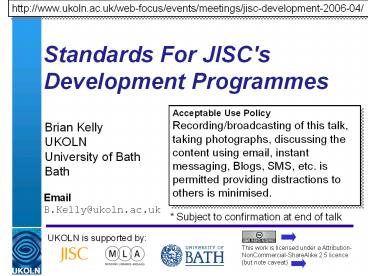Standards For JISC's Development Programmes PowerPoint PPT Presentation
Title: Standards For JISC's Development Programmes
1
Standards For JISC's Development Programmes
http//www.ukoln.ac.uk/web-focus/events/meetings/j
isc-development-2006-04/
Acceptable Use Policy Recording/broadcasting of
this talk, taking photographs, discussing the
content using email, instant messaging, Blogs,
SMS, etc. is permitted providing distractions to
others is minimised.
- Brian Kelly
- UKOLN
- University of Bath
- Bath
Email B.Kelly_at_ukoln.ac.uk
Subject to confirmation at end of talk
UKOLN is supported by
This work is licensed under a Attribution-NonComme
rcial-ShareAlike 2.5 licence (but note caveat)
2
Contents
- Open standards are great but don't always work
- Addressing the tensions a contextual approach
- Using the model
- The JISC view AT
- Breakout groups
- Feedback from projects
- Developing implementing policies
- Extending the coverage
- (Community response to model)
- Report back general discussion
3
Open Standards Are Great
Background
- JISC's development programmes
- Traditionally based on use of open standards to
- Support interoperability
- Maximise accessibility
- Avoid vendor lock-in
- Provide architectural integrity
- Help ensure long-term preservation
- History
- eLib Standards document (v1 1996, v2 1998)
- DNER Standards document (2001)
- which influenced
- NOF-digi Technical Standards
- ..
4
But Don't Always Work
Background
- There's a need for flexibility
- Learning the lesson from OSI networking protocols
- Today
- Is the Web (for example) becoming over-complex
- "Web service considered harmful"
- The lowercase semantic web / Microformats
- Lighter-weight alternatives being developed
- Responses from the commercial world
- What is an open standard?
- RSS key standard for JISC development, but
- RSS 1.0 hasn't really taken off and author admits
has flaws - RSS 2.0 is simpler but does Podcasting
- Neither is a proper standard, but both provide
very valuable services - What should we do? (Atom's flaws may not yet be
apparent)
5
Compliance Issues
Background
- What does must mean?
- You must comply with HTML standards
- What if I don't?
- What if nobody does?
- What if I use PDF?
- You must clear rights on all resources you
digitise - You must provide properly audited accounts
- What if I don't?
5/99 programme 80 of project home page not
HTML compliant
There is a need to clarify the meaning of must
and for an understandable, realistic and
reasonable compliance regime
6
The Context
Background
- There will be a context to use of standards
- The intended use
- Mainstream ? Innovative / research
- Key middleware component ? Small-scale
deliverable - Organisational culture
- HE vs FE ? Teaching vs Research
- Service vs Development ?
- Available Funding Resources
- Significant funding training to make use of
important new standards - Minimal funding - current skills should be used
7
The Layered Standards Model
Owner
JISC
3rd Parties
Context Compliance
JISC / project
External
Self assessment
Learning
Penalties
JISC's layered standards model, developed by UKOLN
8
Implementation
- How might this approach be used in practice?
Contextual Model
9
The Standards Catalogue
- The information provided aims to be simple and
succinct (but document will still be large when
printed!)
- Standard Dublin Core
- About the Standard Dublin Core is a metadata
standard made up - Version New terms are regularly added to
- Maturity Dublin Core has its origins in
workshops held - Risk Assessment Dublin Core plays a key role .
It is an important standard within the context of
JISC development programmes. - Further Information
- DCMI, lthttp//dublincore.org/gt
- Author Pete Johnston, UKOLN
- Contributor
- Date Created 04 Oct 2005
- Update History Initial version.
Example
Note that as the standards catalogue is intended
for wide use the contents will need to be fairly
general
10
Standards Catalogue Process
Feedback
- There's a need for developing and enhancing the
standards catalogue in order to - Update with new standards
- Learn from feedback and experiences
Review
Standards
The Standards Catalogue can be integrated with
the E-Framework
11
Accessing The Content
http//www.ukoln.ac.uk/repositories/digirep/index
/DigRepStandardsHome
- Content available via the Digital Repositories
Wiki
Note we plan to move to a more general URL shortly
12
Providing Feedback (1)
- Feedback from JISC Programme managers, funded
projects, etc. is important - The Discussion tab can be used by registered
users to provide - Specific feedback on the standards entries
- Suggestions for further information (e.g. case
studies you've written)
More generic feedback on the model, its
applications, etc. may be provided using other
mechanisms Opportunity for discussion on best
options.
13
Providing Feedback (2)
Feedback
- Issues
- Little, if any, feedback received for eLib DNER
standards documents - Feedback wanted on content and standards model
not on implementation issues will be difficult
to achieve - Desirable (?) for feedback and general discussion
to be focussed on a specific call - Wiki can be useful for specific comments, but not
for ongoing discussion
14
Sustainability
Feedback
- How do we
- Sustain, maintain and grow the standards
catalogue? - Develop a sustainable support infrastructure?
- Ensure that JISC supports learning organisations
(and that JISC is a learning organisation) - Suggestions
- Build on QA Focus approach (briefing docs and
case studies) - Contractual requirement for projects to produce
end-user deliverables and deliverables related to
development process
15
Questions
- Any questions?

